In Focus This Week
Election Day 2024
Election professionals administer safe and secure election
By M. Mindy Moretti
electionline.org
Ballots still need to be processed and counted, audits conducted and results certified before the 2024 election officially comes to an end, but Election Day 2024 is over.
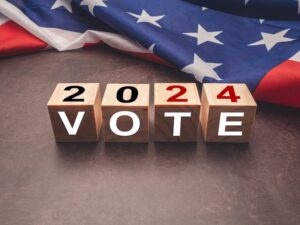 And while Tuesday was not without incident, it was, for all intents and purposes, a run of the mill election.
And while Tuesday was not without incident, it was, for all intents and purposes, a run of the mill election.
“The culmination of voting on Tuesday has demonstrated that once again our election professionals have administered a safe and secure election in the face of adversity,” said Tammy Patrick, chief programs officer at the Election Center. “From flooding and hurricanes to foreign disruption campaigns, our election officials did all in their power with the resources on hand to make certain voters had opportunities to vote over the course of the election cycle.”
Not only was the administration of Tuesday’s election relatively smooth, it was safe. While there were isolated incidents – as there always are – and a series of bomb threats connected to Russia did have sporadic impacts, Election Day 2024 was safe and secure.
“As we have said repeatedly, our election infrastructure has never been more secure and the election community never better prepared to deliver safe, secure, free, and fair elections for the American people,” CISA Director Jen Easterly said in a statement. “This is what we saw yesterday in the peaceful and secure exercise of democracy. Importantly, we have no evidence of any malicious activity that had a material impact on the security or integrity of our election infrastructure.”
You can find all of our Election Day Dispatches here and this week, we’ll take a quick look at how things went around the country and next we’ll do a closer state-by-state look at Election Day 2024.
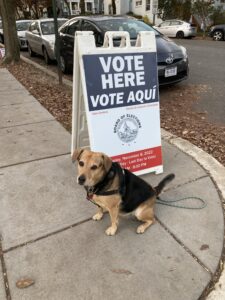 Election Security
Election Security
In addition to the bomb threats previously mentioned, there were isolated skirmishes at polling places around the country. Local law enforcement were quick to respond to those situations and in many cases, those who created the skirmishes are now facing charges.
“Election Day presented a unique set of challenges with new threats and heightened pressures on those tasked with ensuring a safe and accessible voting process,” the Committee for Safe and Secure Elections said in a statement. “The cooperative efforts of law enforcement and election officials, years-long preparation, and coordination across all levels of government have proven to be critical in the face of unacceptable assaults on the election process. All of us should protect voters, election officials and their families from threats.”
There were no known reports of any cyberattacks.
Accepting the Results
Unlike elections in the recent past, there have been no widespread cries about election fraud. In her concession speech, Vice President Kamala Harris accepted the results and thanked poll workers and local elections officials for their work.
“A fundamental principle of American democracy is that when we lose an election, we accept the results,” Harris said in her speech from Howard University. “…[T]o the poll workers and the local election officials I thank you. I thank you all.”
While Harris accepted the results and President Election Donald Trump backed off claims about voter fraud he posted on Truth Social early in the day, that didn’t stop some social media users, especially those on X, from questioning the results although there is absolutely no validity to their assertions (again).
 “Millions of ballots were cast in [Tuesday’s] election, by mail and in-person, early and on Election Day. Over the coming days and weeks, election offices nationwide will count every eligible ballot to get the official total for every contest on the ballot, from national contests like president down to the smallest local office or issue. The numbers and margins will change as election officials follow their state laws and count all eligible ballots. This is to be expected because every vote matters,” the National Association of State Election Directors said in a statement.
“Millions of ballots were cast in [Tuesday’s] election, by mail and in-person, early and on Election Day. Over the coming days and weeks, election offices nationwide will count every eligible ballot to get the official total for every contest on the ballot, from national contests like president down to the smallest local office or issue. The numbers and margins will change as election officials follow their state laws and count all eligible ballots. This is to be expected because every vote matters,” the National Association of State Election Directors said in a statement.
Ballot Measures
There were a number of state and local elections-related ballot measures up for vote on Tuesday. We’ll look more closely at those on a state-by-state level next week. Ranked choice voting appeared on the most ballots and for state ballot measures, the status quo won the day – with a ballot measure to implement RCV losing in Oregon, and ballot measures to implement open primaries and RCV falling in Colorado, Idaho, and Nevada. A ballot measure to keep RCV and open primaries in Alaska is neck-and-neck and may take several days to call, with absentee ballots continuing to arrive for 15 days.
“Changing the status quo is never easy. Entrenched interests – including several state parties and an increasingly well-organized national opposition – pushed back hard on this year’s statewide ballot measures. But make no mistake: The future remains bright for ranked choice voting,” said Meredith Sumpter, president and CEO of FairVote.
The residents of Washington, D.C. did however, overwhelmingly vote to move to a ranked choice voting system and allow Independents to vote in party primaries. The changes are not automatic, however. Because Initiative 83 has a fiscal impact, the D.C. Council must appropriate funds before it can go into effect. Additionally, as with all D.C. laws, whether approved by the council or the people, I-83 could be hamstrung by by interference from home rule opponents in Congress.
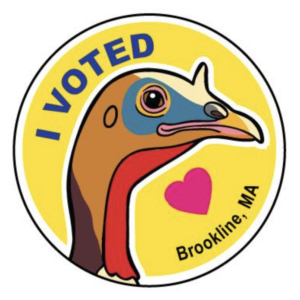 Additionally voters in eight states approved statewide ballot measures banning noncitizens from voting. The amendments passed in Iowa, Missouri, North Carolina, Oklahoma, South Carolina and Wisconsin will modify existing language in those states’ constitutions to state that “only” citizens can vote. Current language states that “every citizen” or “all citizens” can do so. In Idaho and Kentucky, the amendments will insert language in those states’ constitutions stating that “no person who is not a citizen of the United States” can vote.
Additionally voters in eight states approved statewide ballot measures banning noncitizens from voting. The amendments passed in Iowa, Missouri, North Carolina, Oklahoma, South Carolina and Wisconsin will modify existing language in those states’ constitutions to state that “only” citizens can vote. Current language states that “every citizen” or “all citizens” can do so. In Idaho and Kentucky, the amendments will insert language in those states’ constitutions stating that “no person who is not a citizen of the United States” can vote.
State Election Official Races
The top state election official spot was on the ballot in seven states and while ballots are still being counted in a few of those states, the results appear to be as expected.
In Missouri, Republican state Sen. Denny Hoskins defeated Democratic state Rep. Barbara Phifer. With all precincts reporting, the final, unofficial tally showed Hoskins defeated Phifer 58% to 40%. “The right to vote is fundamental,” Hoskins said, “and I will work hard to ensure voters know that their ballots are safe and that our elections are secure.”
In Montana, incumbent Secretary of State Christi Jacobsen was declared the winner. At the time of reporting, Republican Jacobsen received 62% of the vote, with Democrat Jesse Mullen trailing behind with 35% of the vote and John Lamb at 3%.
 In Oregon, Democratic State Treasurer Tobias Read is leading Republican state Sen. Dennis Linthicum of Beatty with nearly 54% of the vote compared with 43% for Linthicum in returns posted early on November 6. “I am honored to be elected Oregon’s next secretary of state,” Read said in a social media post. “Let us begin the essential work of protecting voting rights and restoring public trust in government.”
In Oregon, Democratic State Treasurer Tobias Read is leading Republican state Sen. Dennis Linthicum of Beatty with nearly 54% of the vote compared with 43% for Linthicum in returns posted early on November 6. “I am honored to be elected Oregon’s next secretary of state,” Read said in a social media post. “Let us begin the essential work of protecting voting rights and restoring public trust in government.”
In Utah Gov. Spencer Cox and his running mate Diedre Henderson were re-elected to a second term. As lieutenant governor, Henderson has oversight of the state’s elections division.
Vermont Secretary of State Sarah Copeland Hanzas won a second term. Democrat Copeland Hanzas prevailed over Republican challenger H. Brooke Paige. She said Tuesday night that it’s all about teamwork. “You made tonight possible. You made this victory possible. you made campaigns up and down the ballot possible because of the work that you did. We can’t do it without you. So thank you so much for getting out there and working for the candidate of your choice,” Copeland Hanzas said.
Incumbent Washington Secretary of State Steve Hobbs (D) is currently receiving nearly 60 percent of the vote, compared to Republican challenger Dale Whitaker..
In West Virginia, Kris Warner, director of the state Economic Development Authority, will be the new secretary of state. Warner, a Republican and brother to outgoing secretary of state Mac Warner, won the general election over Democrat opponent Thornton Cooper, a South Charleston attorney. The Associated Press called the race for Warner at 8:46 p.m. Tuesday, when Warner had pulled in about 70% of the votes that had been counted, compared to Cooper’s 30%, according to unofficial results.
And in Arkansas, Secretary of State John Thurston will serve the remaining two years of the current state treasurer’s term. Thurston’s election means Gov. Sarah Huckabee Sanders will appoint a new secretary of state to complete his term. Thurston will be eligible to run for treasurer again in 2026. He said Tuesday that the possibility of leaving his current office “was the hardest thing” about running for treasurer.
Missouri Poll Workers
And while we will take a state-by-state deep dive next week, we would be remiss if we didn’t mention the tragic loss of two poll workers in Wright County.
A married pair of poll workers drowned during flash flooding while headed to an election site early Tuesday, authorities said. The incident happened around 4:30 a.m. when floodwaters from Beaver Creek swept away three vehicles, the Missouri State Highway Patrol confirmed.
The married couple, a 70-year-old man and a 73-year-old woman from Manes, tried to swim to dry land but did not survive. They were found dead at about 8:45 a.m. A drone located the couple, according to officials.
The Wright County Clerk’s Office described the poll workers as “dedicated citizens who valued fair and honest elections” and said they will be missed.
“This is a terrible loss for Wright County,” Loni Pedersen, the county clerk, said in a statement. “This couple were wonderful people who donated their time to serve their community. We will miss them dearly and the service they provided to my office.”
electionline Daily News Email
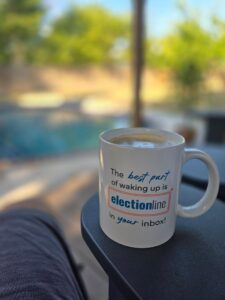 What’s the best part of waking up? electionline Daily News in your inbox of course so be sure to sign up for your daily dose.
What’s the best part of waking up? electionline Daily News in your inbox of course so be sure to sign up for your daily dose.
Each morning you’ll receive the top headlines of the day, plus a listing of states featured in that day’s news round up.
To sign up, simply visit our site and provide us with your email and you’ll begin receiving the news in your inbox each morning.
We Google so you don’t have to!
New Research and Reports
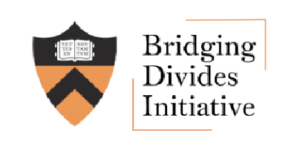 Threat Response: Over the past two years, the Bridging Divides Initiative has conducted interviews with more than 150 local elected officials to gain a deeper understanding of the impact of threats and harassment on local government. These conversations have painted a concerning picture of hostility at the local level, but they have also revealed the wide array of tools officials are leveraging to respond to threats and harassment. Analyzing the variety of risk mitigation strategies surfaced throughout the interview research, this report breaks down five key response types that were consistently highlighted by officials at the frontlines of local government.
Threat Response: Over the past two years, the Bridging Divides Initiative has conducted interviews with more than 150 local elected officials to gain a deeper understanding of the impact of threats and harassment on local government. These conversations have painted a concerning picture of hostility at the local level, but they have also revealed the wide array of tools officials are leveraging to respond to threats and harassment. Analyzing the variety of risk mitigation strategies surfaced throughout the interview research, this report breaks down five key response types that were consistently highlighted by officials at the frontlines of local government.
- Individual strategies: Personal behavioral changes that can be made in response to, or to be prepared for, hostility.
- Peer support: Networks with other local officials that can help to navigate the difficult experiences of hostility.
- Connections with town administrators and service providers: Community relationships with policy makers, other non-elected staff, and local law enforcement that can support threat assessment and response.
- Official procedures and community outreach approaches: Ways to leverage the resources of local government to effectively and safely engage with constituents.
- Legal and security options: Frameworks for when and how to elevate credible threats.
Overall, officials articulated a deep commitment to serve their communities and resolve conflict constructively, even in the face of threats and harassment. Focused on steps that are within their direct control, they have developed a range of creative, resilient approaches aimed at managing the symptoms of the current climate of hostility and mitigating immediate short-term risks. At the same time, officials also underscored the need for systems-wide solutions that would enable local governments to move out of this hostile climate over the long term. The insights from these interviews offer guidance, lessons, and best practices for other officials navigating hostile situations, and can inform further research into curative interventions to protect local democracy and civic space going forward.
Legal Updates
 Arizona: Maricopa Superior Court Judge Scott Blaney has ordered the names of 218,000 voters who are improperly registered to vote due to a data “glitch” can be released to a Trump-aligned group and GOP lawmakers who are seeking the data. The conservative non-profit America First Legal, led by Stephen Miller, a former senior advisor to Trump and the architect of the former president’s anti-immigration policies, filed a lawsuit to compel the secretary of state’s office to produce the records after it refused to do so. During a hearing earlier this week, Secretary of State Adrian Fontes argued that releasing the data could result in harassment or violence against those who appear on the list. “At several points during his testimony, the Secretary argued that he would withhold the requested information if his act of withholding ‘could save just one life,’ or words to that effect,” Maricopa Superior Court Judge Scott Blaney wrote in his ruling. “If the Court were to adopt this standard — that a public official may withhold public records whenever he subjectively believes such withholding could somehow ‘save even one life’ — the Court would be adopting an impermissibly broad, arbitrary standard where the best interest of the state exception swallows the entirety of the Arizona Public Records law.” The court rejected Fontes’ claims that voters on the list could face potential harassment or violence, saying that the claims “were not credible and not supported by evidence.” Blaney also swept aside an argument made by Fontes that the records are not available in the form that Hamilton’s group requested. “There is no exception under the Public Records Law for ‘imperfect or unreliable’ information,” Blaney said. “An agency cannot withhold records because it believes that these records contain imperfect or unreliable information. Indeed, when public agencies make mistakes, the public has an even greater interest in the disclosure of such information.”
Arizona: Maricopa Superior Court Judge Scott Blaney has ordered the names of 218,000 voters who are improperly registered to vote due to a data “glitch” can be released to a Trump-aligned group and GOP lawmakers who are seeking the data. The conservative non-profit America First Legal, led by Stephen Miller, a former senior advisor to Trump and the architect of the former president’s anti-immigration policies, filed a lawsuit to compel the secretary of state’s office to produce the records after it refused to do so. During a hearing earlier this week, Secretary of State Adrian Fontes argued that releasing the data could result in harassment or violence against those who appear on the list. “At several points during his testimony, the Secretary argued that he would withhold the requested information if his act of withholding ‘could save just one life,’ or words to that effect,” Maricopa Superior Court Judge Scott Blaney wrote in his ruling. “If the Court were to adopt this standard — that a public official may withhold public records whenever he subjectively believes such withholding could somehow ‘save even one life’ — the Court would be adopting an impermissibly broad, arbitrary standard where the best interest of the state exception swallows the entirety of the Arizona Public Records law.” The court rejected Fontes’ claims that voters on the list could face potential harassment or violence, saying that the claims “were not credible and not supported by evidence.” Blaney also swept aside an argument made by Fontes that the records are not available in the form that Hamilton’s group requested. “There is no exception under the Public Records Law for ‘imperfect or unreliable’ information,” Blaney said. “An agency cannot withhold records because it believes that these records contain imperfect or unreliable information. Indeed, when public agencies make mistakes, the public has an even greater interest in the disclosure of such information.”
 California: A lawsuit against California’s secretary of state and several counties that alleges thousands of votes were counted twice in the 2022 election. The suit was filed by a law firm representing the Election Integrity Project California. The suit says EIPC compared a list of voters in the November, 2022 statewide general election with the certified election results. The EIPC says there was a statewide difference of more than 40,000 votes. Those votes were counted twice. Robert Tyler, the lawyer representing EIPC said the suit calls for “Special Masters” to oversee any discrepancies in voting in the general election, “A special master could be a judge, possibly our judge in the county of Sacramento could appoint another judge to oversee the process of certification.” Tyler said they tried to get a court date on election day, but the court denied, now they’re trying to get one before the general election votes are certified, “We are going to be submitting an application today or tomorrow asking for the court to shorten the timeframe to get a hearing before a judge and before the votes are certified.”
California: A lawsuit against California’s secretary of state and several counties that alleges thousands of votes were counted twice in the 2022 election. The suit was filed by a law firm representing the Election Integrity Project California. The suit says EIPC compared a list of voters in the November, 2022 statewide general election with the certified election results. The EIPC says there was a statewide difference of more than 40,000 votes. Those votes were counted twice. Robert Tyler, the lawyer representing EIPC said the suit calls for “Special Masters” to oversee any discrepancies in voting in the general election, “A special master could be a judge, possibly our judge in the county of Sacramento could appoint another judge to oversee the process of certification.” Tyler said they tried to get a court date on election day, but the court denied, now they’re trying to get one before the general election votes are certified, “We are going to be submitting an application today or tomorrow asking for the court to shorten the timeframe to get a hearing before a judge and before the votes are certified.”
 Colorado: Second Judicial District Judge Kandace Gerdes denied the Libertarian Party’s request to remove Colorado’s secretary of state from office after a staffer posted voting machine passwords online. “Even if petitioners could meet their burden to show that C.R.S. § 1-13-708(2) was violated, the Colorado secretary of state independently acted to correct the wrongful act before the instant litigation was filed,” Gerdes wrote in a 10-page opinion. In June, a state employee posted a spreadsheet titled “Voting Systems Inventory” on the state website which unbeknownst to everyone in the office contained 600 of the state’s basic input/output system, or BIOS, passwords on a hidden tab. The passwords are needed to access the state’s election management system, ballot scanners and its adjudication system, in tandem with county administrative passwords. In late October, Secretary of State Jena Griswold became aware that the passwords were online, removed them, and worked to remedy the security breach. The Libertarian Party of Colorado sued Griswold demanding her removal from office and a hand count of the 2024 election results. Gerdes found Griswold “substantially complied with correcting the BIOS password breach and has verified that no affected voting machines were compromised.” Gerdes also noted no evidence had been presented to indicate anyone in the secretary of state’s office knowingly posted the passwords online.
Colorado: Second Judicial District Judge Kandace Gerdes denied the Libertarian Party’s request to remove Colorado’s secretary of state from office after a staffer posted voting machine passwords online. “Even if petitioners could meet their burden to show that C.R.S. § 1-13-708(2) was violated, the Colorado secretary of state independently acted to correct the wrongful act before the instant litigation was filed,” Gerdes wrote in a 10-page opinion. In June, a state employee posted a spreadsheet titled “Voting Systems Inventory” on the state website which unbeknownst to everyone in the office contained 600 of the state’s basic input/output system, or BIOS, passwords on a hidden tab. The passwords are needed to access the state’s election management system, ballot scanners and its adjudication system, in tandem with county administrative passwords. In late October, Secretary of State Jena Griswold became aware that the passwords were online, removed them, and worked to remedy the security breach. The Libertarian Party of Colorado sued Griswold demanding her removal from office and a hand count of the 2024 election results. Gerdes found Griswold “substantially complied with correcting the BIOS password breach and has verified that no affected voting machines were compromised.” Gerdes also noted no evidence had been presented to indicate anyone in the secretary of state’s office knowingly posted the passwords online.
Two women, one of them a U.S. Postal Service employee, have been charged with stealing mail ballots in Mesa County this year and then fraudulently casting them. Prosecutors announced Wednesday that Vicki Lyn Stuart, the USPS employee, and Sally Jane Maxedon are suspected of forgery, identity theft and attempting to influence a public servant. Maxedon told authorities she conspired with Stuart, a mail carrier, to “test” the state’s voter signature verification system by stealing ballots, forging voter signatures on them and then fraudulently casting them. According to authorities, the two women intercepted the mail ballots this year before they could reach their intended recipients. Maxedon, 59, is registered as a Republican voter in Colorado. Stuart, 64, is registered as an unaffiliated voter. Prosecutors listed 16 victims on the charging documents for Stuart and Maxedon. State elections officials initially said 12 ballots were stolen and fraudulently cast in the scheme. Prosecutors wrote in charging documents that there may be as many as 20 victims of the ballot scheme. The ballot scheme was discovered by elections officials in Mesa County in October through the state’s signature verification process.
Virginia Chau, a former election worker is suing Denver, alleging city officials violated her First Amendment right to free speech by firing her after she appeared on Jon Stewart’s streaming show two years ago to talk about election safety. Chau worked as a polling center supervisor in Denver for four years before she appeared on Apple TV+’s “The Problem with Jon Stewart” in 2022 to speak about the danger that angry, politicized voters pose to election workers and her experiences as an Asian-American woman working at a voting center, according to the lawsuit filed Monday in U.S. District Court in Denver. When Chau appeared on television, she “raised concerns about threats against elections officials and the lack of training provided to those who work hard to ensure that our elections are safe, fair and accurate,” the lawsuit stated. Chau said the city fired her to punish her for speaking out and to “silence her,” according to the lawsuit against the city of Denver, the city’s clerk and recorder and the director of Denver’s election division. The lawsuit alleges the city’s firing of Chau violates her First Amendment right and constitutes unlawful retaliation for exercising her right to free speech by speaking out “as a private citizen about issues of public concern regarding dangers to and mistreatment of election judges.” Chau is asking for compensation for economic damages, attorney’s fees and costs, past and future monetary losses, physical and mental pain, humiliation, fear, anxiety, and more, the lawsuit stated. She is also asking to be reinstated to her previous position as a polling center supervisor and for Denver to institute new policies and training to keep election workers safe at the polls.
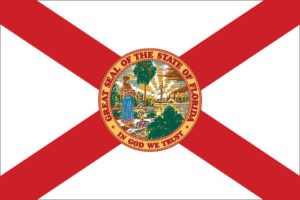 Florida: Andrew Francis, 32, of Clearwater, was charged with a misdemeanor after he allegedly hit a woman November 2 at an early voting site who had opposing political views, according to police. Francis “made numerous aggressive actions and used verbal obscenities toward an opposing political group,” police said, outside of the Clearwater Courthouse, which is being used as an early voting location. Francis allegedly crossed the street and hit the woman in the “opposing political group” with his shoulder, making her lose her balance, according to police. Francis was booked into the Pinellas County Jail on a charge of simple battery.
Florida: Andrew Francis, 32, of Clearwater, was charged with a misdemeanor after he allegedly hit a woman November 2 at an early voting site who had opposing political views, according to police. Francis “made numerous aggressive actions and used verbal obscenities toward an opposing political group,” police said, outside of the Clearwater Courthouse, which is being used as an early voting location. Francis allegedly crossed the street and hit the woman in the “opposing political group” with his shoulder, making her lose her balance, according to police. Francis was booked into the Pinellas County Jail on a charge of simple battery.
 Georgia: Thousands of voters in Georgia’s third-largest county who received their absentee ballots late will not get an extension to return them, the state’s highest court decided on Monday. Cobb County didn’t mail out absentee ballots to some 3,400 voters who had requested them until late last week. Georgia law says absentee ballots must be received by the close of polls on Election Day. But Senior Judge Robert Flournoy ruled last week that the ballots at issue could be counted if they’re received by this Friday, three days after Election Day, as long as they were postmarked by Tuesday. The Georgia Supreme Court ruling means the affected Cobb County residents must vote in person on Election Day, which is Tuesday, or bring their absentee ballots to the county elections office by 7 p.m. that day. The high court ruling instructs county election officials to notify the affected voters by email, text message and in a public message on the county election board’s website. And it orders officials to keep separate and sealed any ballots received after the Election Day deadline but before 5 p.m. Friday.
Georgia: Thousands of voters in Georgia’s third-largest county who received their absentee ballots late will not get an extension to return them, the state’s highest court decided on Monday. Cobb County didn’t mail out absentee ballots to some 3,400 voters who had requested them until late last week. Georgia law says absentee ballots must be received by the close of polls on Election Day. But Senior Judge Robert Flournoy ruled last week that the ballots at issue could be counted if they’re received by this Friday, three days after Election Day, as long as they were postmarked by Tuesday. The Georgia Supreme Court ruling means the affected Cobb County residents must vote in person on Election Day, which is Tuesday, or bring their absentee ballots to the county elections office by 7 p.m. that day. The high court ruling instructs county election officials to notify the affected voters by email, text message and in a public message on the county election board’s website. And it orders officials to keep separate and sealed any ballots received after the Election Day deadline but before 5 p.m. Friday.
Fulton County Superior Court Judge Kevin Farmer rejected a last-minute lawsuit from the Georgia GOP and the Republican National Committee that would have prevented elections workers in Fulton County from accepting absentee ballots submitted to county elections offices during the weekend before the election. As of 2021, Georgia’s election code has restricted the hours that voters can return absentee ballots to election drop boxes, allowing drop boxes only to be used during the polling place’s regular hours. In a lawsuit filed late on Nov. 1, Republicans alleged that election officials in Fulton County were violating state election law regarding drop box hours, despite the fact that no drop boxes were involved in the instances of absentee ballots that were returned over the weekend. Alex Kaufman, the lawyer for the Republican Party, also argued that under Georgia law, “there’s absolutely no provision,” that allows voters to hand-deliver ballots to the registrar. Farmer rejected the argument, quoting the law aloud to the lawyers during an emergency hearing the morning after the lawsuit was filed. “’Such envelope shall then be securely sealed, and the Elector shall then personally mail or personally deliver same to the board of registrars or absentee ballot clerk,’” Farmer said. “That seems to indicate that personal delivery to the registrar and not to a drop box, is kosher. And more than kosher, lawful.”
Fulton Superior Court Judge Kevin Farmer ruled that the Republican Party can’t force Fulton County to hire more of its handpicked election workers right before Election Day. Farmer rejected the party’s last-minute effort to install partisan poll workers for Tuesday’s election. “You apply for a job, send out 10 resumes (and) don’t always get called back,” Farmer said. “Some of your folks got hired. … You got a fair percentage.” Kevin Kucharz, an attorney for the Republican Party, said state law compels Fulton Election Director Nadine Williams to hire the GOP’s election workers. “There is no purpose in letting parties submit lists unless there’s an intent of the General Assembly to give those people proper consideration and priority,” Kucharz said. “The statute exists to give political parties an inroad into the political system.” But Farmer said the law doesn’t say political parties get priority in hiring. It only requires consideration and equal representation among political parties that submit names of potential poll workers.
Fulton County Superior Court Judge Robert McBurney rejected a Fulton County election board member’s demand for more documents she says she needs to certify the results of Tuesday’s election. Last week, the board approved a list of documents it will review as it prepares to certify the results by 5 p.m. Nov. 12. Board member Julie Adams sought more information — including daily lists of complaints by poll workers, poll watchers and voters. And she wanted all the documents in electronic format. Her fellow board members rejected her requests, citing security concerns and the burden Adams’ requests would put on workers during a busy election week. Adams filed a lawsuit seeking a court order requiring the election department to produce the information she wanted. McBurney rejected her request — and he cited Adams’ own actions for the decision.
Nicholas Wimbish, 25 of Milledgeville, was arrested for making a fake bomb threat to Jones County poll workers, according to a press release from the U.S. Attorney’s Office for the Middle District of Georgia. Wimbish faces a maximum of 25 years in prison for mailing in a bomb threat, lying about it and making false statements to the FBI. Per the report, Wimbish was working as a poll worker at the Jones County Elections Office on Oct. 16 when he got into a verbal argument with a voter. The next day, Wimbish mailed a letter to the Jones County Elections Superintendent “from a Jones County Voter.”
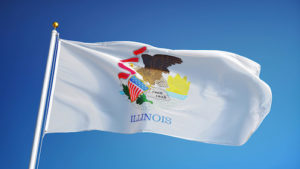 Illinois: Daniel Schmidt of Orland Park has been charged with punching an election judge at a polling place in Orland Park, after refusing to wait in line for early voting on Sunday morning. According to witnesses, Schmidt skipped a line of about 100 people waiting to vote at the early voting location. Election officials learned Schmidt had tried to cut the line for early voting, and when the election judge told him to go to the back of the line and wait his turn, he refused. Another election judge was called to assist, but Schmidt again refused to go to the back of the line, and began yelling profanities. “I got in his way to stop him,” the election judge said. “We exchanged some words, and then he hit me in the left side of my face.” Schmidt also struck an 81-year-old woman and knocked her off balance, police and Cook County prosecutors said. The election judge said another poll worker and a voter stepped in and wrestled Schmidt down until police came. Police said Schmidt resisted officers as well. “Nothing political. He didn’t sound like he was from either party,” the election judge said. “He just sounded like he wanted to have his way, and that we were stopping him from having his way.”
Illinois: Daniel Schmidt of Orland Park has been charged with punching an election judge at a polling place in Orland Park, after refusing to wait in line for early voting on Sunday morning. According to witnesses, Schmidt skipped a line of about 100 people waiting to vote at the early voting location. Election officials learned Schmidt had tried to cut the line for early voting, and when the election judge told him to go to the back of the line and wait his turn, he refused. Another election judge was called to assist, but Schmidt again refused to go to the back of the line, and began yelling profanities. “I got in his way to stop him,” the election judge said. “We exchanged some words, and then he hit me in the left side of my face.” Schmidt also struck an 81-year-old woman and knocked her off balance, police and Cook County prosecutors said. The election judge said another poll worker and a voter stepped in and wrestled Schmidt down until police came. Police said Schmidt resisted officers as well. “Nothing political. He didn’t sound like he was from either party,” the election judge said. “He just sounded like he wanted to have his way, and that we were stopping him from having his way.”
 Iowa: The American Civil Liberties Union, ACLU of Iowa and a law firm representing the League of United Latin American Citizens have filed a federal lawsuit against Iowa Secretary of State Paul Pate on behalf of naturalized U.S. citizens in Iowa affected by his order to challenge the ballots of 2,022 people listed as potential noncitizens in the 2024 election. The lawsuit calls for Pate to rescind his guidance calling for county auditors to challenge the ballots of Iowa voters who are on a list compiled by the Secretary of State’s office as potential noncitizens. These voters were labeled as potential noncitizens because an audit conducted by the office found that in the past 12 years, they identified themselves to the Iowa Department of Transportation or another government entity as noncitizens. Since that point, the 2,022 individuals registered to vote or participated in elections. The secretary of state’s office sent lists of these individuals to county auditors last week, directing the county election officials to challenge the qualifications of these voters and have them cast provisional ballots. Many of these individuals are expected to have gained U.S. citizenship through naturalization since reporting themselves as noncitizens to the state, meaning they have the legal right to vote. However, Pate said last week that Iowa was denied access to the U.S. Citizenship and Immigration Services’ Systematic Alien Verification for Entitlements (SAVE) database to check whether these individuals were U.S. citizens, which is why the office pursued the ballot challenging strategy. Pate argued that this approach was needed to address concerns about noncitizens participating in this year’s elections while ensuring that all legal voters could still cast their ballots. The suit names Pate as well as five county auditors in Polk, Winneshiek, Pottawattamie, Johnson and Scott counties, as defendants in the case. U.S. District Judge Stephen Locher ruled Sunday that Iowa can continue challenging the validity of hundreds of ballots from potential noncitizens even though critics said the effort threatens the voting rights of people who’ve recently become U.S. citizens. In his ruling Sunday, Locher pointed to a U.S. Supreme Court decision four days prior that allowed Virginia to resume a similar purge of its voter registration rolls even though it was impacting some U.S. citizens. He also cited the Supreme Court’s recent refusal to review a Pennsylvania Supreme Court decision on state electoral laws surrounding provisional ballots. Those Supreme Court decisions advise lower courts to “act with great caution before awarding last-minute injunctive relief,” he wrote. Locher also said the state’s effort does not remove anyone from the voter rolls, but rather requires some voters to use provisional ballots.
Iowa: The American Civil Liberties Union, ACLU of Iowa and a law firm representing the League of United Latin American Citizens have filed a federal lawsuit against Iowa Secretary of State Paul Pate on behalf of naturalized U.S. citizens in Iowa affected by his order to challenge the ballots of 2,022 people listed as potential noncitizens in the 2024 election. The lawsuit calls for Pate to rescind his guidance calling for county auditors to challenge the ballots of Iowa voters who are on a list compiled by the Secretary of State’s office as potential noncitizens. These voters were labeled as potential noncitizens because an audit conducted by the office found that in the past 12 years, they identified themselves to the Iowa Department of Transportation or another government entity as noncitizens. Since that point, the 2,022 individuals registered to vote or participated in elections. The secretary of state’s office sent lists of these individuals to county auditors last week, directing the county election officials to challenge the qualifications of these voters and have them cast provisional ballots. Many of these individuals are expected to have gained U.S. citizenship through naturalization since reporting themselves as noncitizens to the state, meaning they have the legal right to vote. However, Pate said last week that Iowa was denied access to the U.S. Citizenship and Immigration Services’ Systematic Alien Verification for Entitlements (SAVE) database to check whether these individuals were U.S. citizens, which is why the office pursued the ballot challenging strategy. Pate argued that this approach was needed to address concerns about noncitizens participating in this year’s elections while ensuring that all legal voters could still cast their ballots. The suit names Pate as well as five county auditors in Polk, Winneshiek, Pottawattamie, Johnson and Scott counties, as defendants in the case. U.S. District Judge Stephen Locher ruled Sunday that Iowa can continue challenging the validity of hundreds of ballots from potential noncitizens even though critics said the effort threatens the voting rights of people who’ve recently become U.S. citizens. In his ruling Sunday, Locher pointed to a U.S. Supreme Court decision four days prior that allowed Virginia to resume a similar purge of its voter registration rolls even though it was impacting some U.S. citizens. He also cited the Supreme Court’s recent refusal to review a Pennsylvania Supreme Court decision on state electoral laws surrounding provisional ballots. Those Supreme Court decisions advise lower courts to “act with great caution before awarding last-minute injunctive relief,” he wrote. Locher also said the state’s effort does not remove anyone from the voter rolls, but rather requires some voters to use provisional ballots.
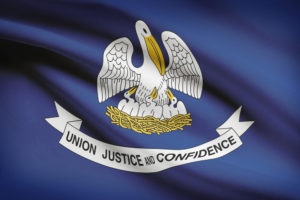 Louisiana: The U.S. Supreme Court agreed to review Louisiana’s congressional map, which has garnered heightened legal attention over the use of race in its design. The decision will have no impact on Tuesday’s election, as the high court previously decided that the Louisiana Legislature’s new map, which includes a second majority-Black district, can stand until after the election. By keeping the map in effect until the high court can review it next year, the justices granted Democrats in the state a slight boon in the race for a closely divided U.S. House of Representatives. The decision adds another step to a yearslong legal battle over how the state’s six congressional districts can be divided. The Supreme Court’s ultimate decision could have significant repercussions for Section 2 of the Voting Rights Act, the enforcement provision of the landmark civil rights bill. Former Obama administration Attorney General Eric Holder called on the Supreme Court to affirm the new map and protect Section 2 in a statement. “The current map provides equal representation for all voters in the state and must be maintained,” Holder said. “A decision that does not recognize that fact or that weakens the Voting Rights Act of 1965 would signal an alarming retreat into a path that so many have fought so long and so hard to pull the country from.” The legal battle began after the 2020 census, when the Republican-led Legislature overrode former Democratic Governor John Edwards’ veto to approve a new congressional map.
Louisiana: The U.S. Supreme Court agreed to review Louisiana’s congressional map, which has garnered heightened legal attention over the use of race in its design. The decision will have no impact on Tuesday’s election, as the high court previously decided that the Louisiana Legislature’s new map, which includes a second majority-Black district, can stand until after the election. By keeping the map in effect until the high court can review it next year, the justices granted Democrats in the state a slight boon in the race for a closely divided U.S. House of Representatives. The decision adds another step to a yearslong legal battle over how the state’s six congressional districts can be divided. The Supreme Court’s ultimate decision could have significant repercussions for Section 2 of the Voting Rights Act, the enforcement provision of the landmark civil rights bill. Former Obama administration Attorney General Eric Holder called on the Supreme Court to affirm the new map and protect Section 2 in a statement. “The current map provides equal representation for all voters in the state and must be maintained,” Holder said. “A decision that does not recognize that fact or that weakens the Voting Rights Act of 1965 would signal an alarming retreat into a path that so many have fought so long and so hard to pull the country from.” The legal battle began after the 2020 census, when the Republican-led Legislature overrode former Democratic Governor John Edwards’ veto to approve a new congressional map.
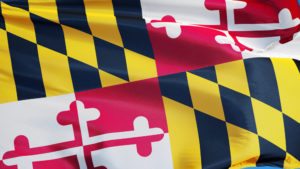 Maryland: Carroll County Election Director Erin Perrone filed a peace order October 30 against a member of the Carroll County Republican Central Committee, claiming that she was being followed as she left an early voting center this week. Perrone filed the peace order in Carroll County District Court against Katherine Adelaide, a member of the county’s Republican Central Committee. Court records state that the peace order was granted against Adelaide during a 10:24 a.m. hearing Wednesday. “A peace order is a form of legal protection for anyone who is experiencing problems with an individual, including someone in a dating relationship, a neighbor, a stranger, or anyone else,” The People’s Law Library of Maryland states on its website. “The peace order enables an individual who wishes to be left alone to ask the court to order another person to stay away and refrain from any contact.” The Carroll County Times obtained an email Perrone sent to members of the Carroll County Board of Elections detailing the incident, which occurred at around 7:40 a.m. It stated: “When I left the Westminster Senior Center, I was followed back to the office by Katherine Adelaide. I got all my stuff out of my car, including the blue ballot bin that I used to empty the drop box. Ms. Adelaide parked behind me in the parking lot to watch me. When I got into the office, I looked at the video footage. Ms. Adelaide pulled her car in front of the building and watched me walk down the hallway into the office.” Perrone stated in the email that she has video footage of Adelaide watching her as she left the Westminster Senior Center. The footage captures Adelaide backing out of her parking space and following her, Perrone stated. Perrone goes on to say in the email that she contacted officials with the Maryland State Board of Elections to report what happened. Perrone also contacted the Office of the Maryland State Prosecutor, who suggested that she file a peace order.
Maryland: Carroll County Election Director Erin Perrone filed a peace order October 30 against a member of the Carroll County Republican Central Committee, claiming that she was being followed as she left an early voting center this week. Perrone filed the peace order in Carroll County District Court against Katherine Adelaide, a member of the county’s Republican Central Committee. Court records state that the peace order was granted against Adelaide during a 10:24 a.m. hearing Wednesday. “A peace order is a form of legal protection for anyone who is experiencing problems with an individual, including someone in a dating relationship, a neighbor, a stranger, or anyone else,” The People’s Law Library of Maryland states on its website. “The peace order enables an individual who wishes to be left alone to ask the court to order another person to stay away and refrain from any contact.” The Carroll County Times obtained an email Perrone sent to members of the Carroll County Board of Elections detailing the incident, which occurred at around 7:40 a.m. It stated: “When I left the Westminster Senior Center, I was followed back to the office by Katherine Adelaide. I got all my stuff out of my car, including the blue ballot bin that I used to empty the drop box. Ms. Adelaide parked behind me in the parking lot to watch me. When I got into the office, I looked at the video footage. Ms. Adelaide pulled her car in front of the building and watched me walk down the hallway into the office.” Perrone stated in the email that she has video footage of Adelaide watching her as she left the Westminster Senior Center. The footage captures Adelaide backing out of her parking space and following her, Perrone stated. Perrone goes on to say in the email that she contacted officials with the Maryland State Board of Elections to report what happened. Perrone also contacted the Office of the Maryland State Prosecutor, who suggested that she file a peace order.
 Michigan: A Hamlin Township woman was arrested for allegedly shoving an election worker after being asked to remove a “political candidate’s hat,” according to the Mason County Sheriff’s Office. Michigan law prohibits wearing or bringing election or campaign-related clothing or accessories within 100 feet of a polling place. The sheriff’s office did not say which candidate. Deputies said when asked to remove the hat, the suspect became “irate,” refused to take the hat off and started recording people. At one point, the township clerk was shoved backward into another township employee, according to the sheriff’s office. The woman then left the building but returned while deputies were on scene. During the arrest, the suspect refused to comply while being handcuffed and struggled with deputies.
Michigan: A Hamlin Township woman was arrested for allegedly shoving an election worker after being asked to remove a “political candidate’s hat,” according to the Mason County Sheriff’s Office. Michigan law prohibits wearing or bringing election or campaign-related clothing or accessories within 100 feet of a polling place. The sheriff’s office did not say which candidate. Deputies said when asked to remove the hat, the suspect became “irate,” refused to take the hat off and started recording people. At one point, the township clerk was shoved backward into another township employee, according to the sheriff’s office. The woman then left the building but returned while deputies were on scene. During the arrest, the suspect refused to comply while being handcuffed and struggled with deputies.
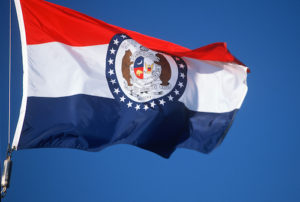 Missouri: Judge Dewayne Johnson denied a Republican committeeman’s effort to force the state’s third-largest county to allow watchers or challengers to observe early voting. Johnson wrote that the document filed by St. Charles County Central Committeeman Travis Allen Heins “fails to satisfy the requirements” of a temporary restraining order. Johnson didn’t consider the merits of the case but dismissed the challenge because it wasn’t written meeting state legal standards. “I’m not an attorney and never claimed to be,” Heins told The Associated Press. He called the ruling disappointing but said his request “opens the conversation” about the need to clarify the roles of watchers and challengers during the early voting period in Missouri. St. Charles County Director of Elections Kurt Bahr welcomed the ruling. “Election challengers from both political parties will be present at several polling locations on election day as state law allows,” Bahr said in a statement. “We hope that the legislature can provide clarity on this issue during their next session.”
Missouri: Judge Dewayne Johnson denied a Republican committeeman’s effort to force the state’s third-largest county to allow watchers or challengers to observe early voting. Johnson wrote that the document filed by St. Charles County Central Committeeman Travis Allen Heins “fails to satisfy the requirements” of a temporary restraining order. Johnson didn’t consider the merits of the case but dismissed the challenge because it wasn’t written meeting state legal standards. “I’m not an attorney and never claimed to be,” Heins told The Associated Press. He called the ruling disappointing but said his request “opens the conversation” about the need to clarify the roles of watchers and challengers during the early voting period in Missouri. St. Charles County Director of Elections Kurt Bahr welcomed the ruling. “Election challengers from both political parties will be present at several polling locations on election day as state law allows,” Bahr said in a statement. “We hope that the legislature can provide clarity on this issue during their next session.”
 New Jersey: A Union County woman who became a U.S. citizen in June and registered to vote in September will be allowed to vote for the first time after Superior Court Judge John Deitch found that her voter registration form was mailed correctly even though county election officials never received it. The woman told Deitch that she had taken her voter registration form to the Elizabeth Post Office on September 15 – one month before the deadline – and that a postal clerk told her to drop it “in a blue box.” “In certain select cases, exceptions may be made,” Deitch said. “Those exceptions include situations where the voter has attempted to register, and through no fault of the voter, that registration has not been recorded.” He said he believed the woman’s account of her voter registration and that she “attempted to timely submit her voter registration form. “She took the paperwork provided to her by the government to her to a post office and followed their instructions with regard to mail and documents. She was instructed to put the mailing in a blue box at the post office; the court takes judicial notice that U.S. mailboxes are blue.”
New Jersey: A Union County woman who became a U.S. citizen in June and registered to vote in September will be allowed to vote for the first time after Superior Court Judge John Deitch found that her voter registration form was mailed correctly even though county election officials never received it. The woman told Deitch that she had taken her voter registration form to the Elizabeth Post Office on September 15 – one month before the deadline – and that a postal clerk told her to drop it “in a blue box.” “In certain select cases, exceptions may be made,” Deitch said. “Those exceptions include situations where the voter has attempted to register, and through no fault of the voter, that registration has not been recorded.” He said he believed the woman’s account of her voter registration and that she “attempted to timely submit her voter registration form. “She took the paperwork provided to her by the government to her to a post office and followed their instructions with regard to mail and documents. She was instructed to put the mailing in a blue box at the post office; the court takes judicial notice that U.S. mailboxes are blue.”
 New York: The New York state Court of Appeals has rejected an appeal from state Republicans challenging part of a state law that allows boards of election to count absentee ballots as soon as polls close on Election Day. The state’s highest court ruled the law expanding absentee balloting is constitutional, rejecting the plaintiffs’ claim the law violates the equal representation mandate in Article II, Section 8 of the New York state Constitution and constitutional principles of judicial review and separation of powers. The law in question was passed by the state Legislature in 2021 following the COVID-19 pandemic and 2020 elections as a way to streamline counting of mail-in votes. In 2020, many New Yorkers voted by absentee as a result of the ongoing pandemic, but at the time, state law prohibited the counties of New York from starting to count absentee ballots until at least three days after Election Day, with many waiting longer than that. Due to the high volume of absentees that year, it took weeks to count them and garner official election results. The court’s ruling Thursday said that provision doesn’t violate the state Constitution’s requirement of “equal representation” of the two major political parties on various election bodies since any member can declare a ballot valid or invalid, and that it does not “unconstitutionally constrain the judiciary.”
New York: The New York state Court of Appeals has rejected an appeal from state Republicans challenging part of a state law that allows boards of election to count absentee ballots as soon as polls close on Election Day. The state’s highest court ruled the law expanding absentee balloting is constitutional, rejecting the plaintiffs’ claim the law violates the equal representation mandate in Article II, Section 8 of the New York state Constitution and constitutional principles of judicial review and separation of powers. The law in question was passed by the state Legislature in 2021 following the COVID-19 pandemic and 2020 elections as a way to streamline counting of mail-in votes. In 2020, many New Yorkers voted by absentee as a result of the ongoing pandemic, but at the time, state law prohibited the counties of New York from starting to count absentee ballots until at least three days after Election Day, with many waiting longer than that. Due to the high volume of absentees that year, it took weeks to count them and garner official election results. The court’s ruling Thursday said that provision doesn’t violate the state Constitution’s requirement of “equal representation” of the two major political parties on various election bodies since any member can declare a ballot valid or invalid, and that it does not “unconstitutionally constrain the judiciary.”
 Ohio: District Judge Christopher Boyko has given the green light to a requirement that naturalized Ohio U.S. citizens show proof of citizenship to cast a ballot. In 2006, the same judge determined a statute requiring challenged voters to provide proof was unconstitutional because it “subjects naturalized citizens to disparate treatment,” and permanently enjoined the law. Now, however, the judge says circumstances are different, and the plaintiffs demanding enforcement of that 2006 order haven’t demonstrated standing. They brought the challenge after Ohio Secretary of State Frank LaRose revised the form used when a voter’s citizenship is challenged at the polls. Following the 2006 ruling blocking the law, a challenged voter only had to attest under oath that they were a citizen to receive a regular ballot. LaRose’s changes reverted to the show-me-your-papers requirement, citing the enjoined statute as the relevant authority. Following the judge’s order, the ACLU of Ohio issued a warning to naturalized voters urging them to bring citizenship documentation to the polls in case they’re challenged.
Ohio: District Judge Christopher Boyko has given the green light to a requirement that naturalized Ohio U.S. citizens show proof of citizenship to cast a ballot. In 2006, the same judge determined a statute requiring challenged voters to provide proof was unconstitutional because it “subjects naturalized citizens to disparate treatment,” and permanently enjoined the law. Now, however, the judge says circumstances are different, and the plaintiffs demanding enforcement of that 2006 order haven’t demonstrated standing. They brought the challenge after Ohio Secretary of State Frank LaRose revised the form used when a voter’s citizenship is challenged at the polls. Following the 2006 ruling blocking the law, a challenged voter only had to attest under oath that they were a citizen to receive a regular ballot. LaRose’s changes reverted to the show-me-your-papers requirement, citing the enjoined statute as the relevant authority. Following the judge’s order, the ACLU of Ohio issued a warning to naturalized voters urging them to bring citizenship documentation to the polls in case they’re challenged.
Jeffrey Hess, 25, of Hamilton County, accused of disrupting voting on Election Day waived his first court appearance. Hess is charged with destruction of election property. Hess is in the Hamilton County Jail and is accused of taking a voting computer from an election site. So far, officials have not shared any details on the case.
 Pennsylvania: Judge Linda Cordaro ordered Washington Township Judge of Elections Vincent Manetta to turn over all ballots and other election material once polls close at 8 p.m. after he had told the county elections chief that he intended to perform a hand count of all the ballots cast in his precinct. Manetta, according to the petition, had told Marybeth Kuznik, the director of the Fayette County Bureau of Elections, and the county’s solicitor, that he planned to perform the hand count despite being told that doing so was outside the scope of his duties. Fayette County officials filed a petition seeking to have Manetta comply with their instructions. Cordaro granted the order and wrote that if Manetta does not comply a Fayette County sheriff’s deputy would escort a poll worker to transport all ballots and other election material from the Washington Township precinct to the Bureau of Elections. “The Sheriff’s Department shall also similarly escort any other Fayette County precinct which is acting outside of the authority outlined in the (state) statute,” Cordaro wrote.
Pennsylvania: Judge Linda Cordaro ordered Washington Township Judge of Elections Vincent Manetta to turn over all ballots and other election material once polls close at 8 p.m. after he had told the county elections chief that he intended to perform a hand count of all the ballots cast in his precinct. Manetta, according to the petition, had told Marybeth Kuznik, the director of the Fayette County Bureau of Elections, and the county’s solicitor, that he planned to perform the hand count despite being told that doing so was outside the scope of his duties. Fayette County officials filed a petition seeking to have Manetta comply with their instructions. Cordaro granted the order and wrote that if Manetta does not comply a Fayette County sheriff’s deputy would escort a poll worker to transport all ballots and other election material from the Washington Township precinct to the Bureau of Elections. “The Sheriff’s Department shall also similarly escort any other Fayette County precinct which is acting outside of the authority outlined in the (state) statute,” Cordaro wrote.
The U.S. Supreme Court on November 1 ruled that voters in Pennsylvania will be able to submit provisional ballots if their mail ballots have been found defective, rejecting requests from the Republican National Committee and Republican Party of Pennsylvania to issue a stay against a state Supreme Court decision. “The lower court’s judgment concerns just two votes in the long-completed Pennsylvania primary,” Justice Samuel Alito wrote in the decision. “Staying that judgment would not impose any binding obligation on any of the Pennsylvania officials who are responsible for the conduct of this year’s election. And because the only state election officials who are parties in this case are the members of the board of elections in one small county, we cannot order other election boards to sequester affected ballots. For these reasons, I agree with the order denying the application.” The RNC and RPP had asked Alito to issue a stay that would have prevented county election officials from being required to count provisional ballots from voters whose mail ballots were fatally flawed. They also sought to have any such provisional ballots that were cast to be segregated until the court could decide on the issue. The case at issue, Faith Genser et al vs. the Butler County Board of Elections, involves Butler County voters who discovered their mail-in ballots might not be counted, and tried to vote in person using provisional ballots on Election Day. They had failed to put their ballots in the required secrecy envelope, and elections officials told them their ballots would be canceled. The state Supreme Court ruled Oct. 23 in a 4-3 decision that the Butler County Board of Elections should have counted the provisional ballots. The state Election Code requires county elections officials to count provisional ballots if no other ballot is attributable to the voter, and as long as there are no other issues that would disqualify their provisional ballot, Justice Christine Donohue wrote in the majority opinion. In their petition, the RNC and RPP argued the Pennsylvania Supreme Court majority’s ruling usurps the Pennsylvania Legislature’s authority to direct the appointment of presidential electors and to set the “times, places and manner” for congressional elections, leaning on a premise known as the “independent state legislature theory.” That theory asserts that the U.S. Constitution reserves the authority to set the times, places and manner of elections exclusively for state legislatures.
Erie Court of Common Pleas Judge David Ridge ordered the Erie County Board of Elections to extend its operating hours and take other steps to ensure that thousands of voters who requested mail ballots but did not receive them can still get mail ballots and return them by the Election Day deadline. The judge’s order comes after the Democratic Party of Pennsylvania sued the county in an attempt to get officials to remedy the problems. The Democratic Party filed the suit on Wednesday, with the support of Vice President Kamala Harris’ presidential campaign, and the Republican Party of Pennsylvania was added as an intervenor on Thursday. Ridge ordered the elections board to remain open over the weekend Saturday and Sunday from 8 a.m. until 4 p.m. and Monday from 8 a.m. to 6 p.m. The issues in Erie began with an Ohio-based third-party vendor, ElectionIQ, a contractor that prints and mails the county’s mail ballots. A software failure caused ElectionIQ to send duplicate ballots that went into incorrect envelopes, with some voters receiving other voters’ envelopes. The U.S. Postal Service said it had been “unable to account for,” another 1,800 mail ballots, according to the lawsuit, which the county says were never mailed by ElectionIQ. The lawsuit claimed that mail ballot return rates in Erie were below the statewide average, with only about 52% of voters who requested mail ballots receiving them by Oct. 28. Statewide, the return number is at 67%. In a hearing in Erie on November 1, it was determined that “at minimum,” 365 duplicate ballots were sent to voters which contained a mail-in ballot that had a barcode corresponding to a different voter. Between 13,000 and 17,000 Erie County voters who had requested a mail ballot have still not received one, and some 1,200 voters who temporarily live out of state, such as college students, had not received their ballots, either.
A Florida-based group is questioning the eligibility of more than 277,000 Pennsylvania voters in a new federal lawsuit, part of a multistate push to challenge the voter rolls ahead of the election. The lawsuit filed October 29 against Pennsylvania Secretary of State Al Schmidt suggests that many of these registrations should have been purged from the rolls two years ago and asks a federal judge to compel the commonwealth to hand over voter records it’s seeking. The suit asserts that more than 277,000 people are still on the commonwealth’s voter registration lists who were unresponsive to notices sent before the 2020 general election. These voters were marked as inactive in the state’s rolls, and the complainants allege they should be purged entirely unless they were reactivated by participating in either of the past two federal elections. but the group in its own filing acknowledges that without additional records, “there is no way to distinguish which of the 277,768 registrants currently registered to vote are active, eligible voters and how many of the 277,768 registrants should have been removed from the voter rolls.” The group wants a judge to block any unresponsive and inactive voters from casting a Nov. 5 ballot unless they first go through the legally-mandated steps for voting after failing to respond to a notice. Schneider called this request “silliness,” since inactive voters already have to go this process, which typically involves filling out an address verification form. Furthermore, Citizens AG wants the courts to order Pennsylvania to administer an “adequate” list maintenance program going forward.
 U.S. Virgin Islands: V.I. Superior Court Judge Yvette Ross Edwards has denied Supervisor of Elections Caroline Fawkes’ motion for a temporary restraining order in her lawsuit against the Board of Elections but has set an evidentiary hearing for November 4 on her request for a preliminary injunction. At issue in the case is whether the board overrode Fawkes’ authority when it voted at a meeting Sept. 4 to place Delegate to Congress candidate Ida Smith on the Nov. 5 ballot after Fawkes had disqualified her based on residency requirements. Besides the temporary restraining order, or TRO, Fawkes is seeking a preliminary injunction, permanent injunction and declaratory relief. Edwards denied the request for a TRO, writing that Fawkes would not be irreparably harmed without one, which is the most significant of four determining factors the court must consider when weighing a TRO or preliminary injunction ruling. It also would not be in the public interest, when early voting was already underway when Fawkes filed her complaint on Oct. 17, and with the General Election just days away, she said. “The public interest factor is particularly weighty in the case,” the order states, noting that early voting began Oct. 14 — more than a month after Fawkes knew Smith’s name was added to the ballot — but she did not file her verified complaint until Oct. 17, her motion until Oct. 28, and supporting documents for the complaint until Oct. 29. Early voting ended Oct. 28, “by which time thousands of Virgin Islanders had already exercised their right to vote,” it says.
U.S. Virgin Islands: V.I. Superior Court Judge Yvette Ross Edwards has denied Supervisor of Elections Caroline Fawkes’ motion for a temporary restraining order in her lawsuit against the Board of Elections but has set an evidentiary hearing for November 4 on her request for a preliminary injunction. At issue in the case is whether the board overrode Fawkes’ authority when it voted at a meeting Sept. 4 to place Delegate to Congress candidate Ida Smith on the Nov. 5 ballot after Fawkes had disqualified her based on residency requirements. Besides the temporary restraining order, or TRO, Fawkes is seeking a preliminary injunction, permanent injunction and declaratory relief. Edwards denied the request for a TRO, writing that Fawkes would not be irreparably harmed without one, which is the most significant of four determining factors the court must consider when weighing a TRO or preliminary injunction ruling. It also would not be in the public interest, when early voting was already underway when Fawkes filed her complaint on Oct. 17, and with the General Election just days away, she said. “The public interest factor is particularly weighty in the case,” the order states, noting that early voting began Oct. 14 — more than a month after Fawkes knew Smith’s name was added to the ballot — but she did not file her verified complaint until Oct. 17, her motion until Oct. 28, and supporting documents for the complaint until Oct. 29. Early voting ended Oct. 28, “by which time thousands of Virgin Islanders had already exercised their right to vote,” it says.
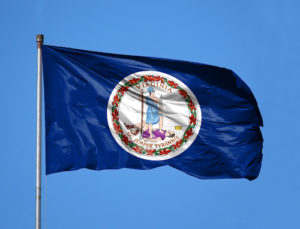 Virginia: Judge Paul Dryer ordered Waynesboro Election Board Chair Curtis Lilly and Vice Chair Scott Mares to certify the results of the election after they filed a lawsuit last month threatening not to certify unless they could hand-count the ballots. Lilly and Mares argued that election officials do not have access to the votes tallied by machines, which prevents them from verifying “the results of the voting machine’s secret canvass.” Dryer issued a ruling ordering the officials to go through with the certification. “The concerns that the Defendants raise regarding the security and accuracy of the electoral process are best raised via the legislative process,” Dryer wrote. “The personal beliefs of members of a local board of elections cannot derail the electoral process for the entire Commonwealth.” Thomas Ranieri, the attorney for the defendants, said they have agreed to comply with the order. “They are law-abiding citizens,” he said. The order does not settle the original lawsuit, which is ongoing.
Virginia: Judge Paul Dryer ordered Waynesboro Election Board Chair Curtis Lilly and Vice Chair Scott Mares to certify the results of the election after they filed a lawsuit last month threatening not to certify unless they could hand-count the ballots. Lilly and Mares argued that election officials do not have access to the votes tallied by machines, which prevents them from verifying “the results of the voting machine’s secret canvass.” Dryer issued a ruling ordering the officials to go through with the certification. “The concerns that the Defendants raise regarding the security and accuracy of the electoral process are best raised via the legislative process,” Dryer wrote. “The personal beliefs of members of a local board of elections cannot derail the electoral process for the entire Commonwealth.” Thomas Ranieri, the attorney for the defendants, said they have agreed to comply with the order. “They are law-abiding citizens,” he said. The order does not settle the original lawsuit, which is ongoing.
 Washington: Washington state’s highest court is weighing the constitutionality of the signature verification policy on mail-in ballots. “The state of Washington infringes and burdens the right to vote with a subjective signature matching process that has operated to deprive more than 170,000 fully qualified Washington voters of the right to vote just since 2016,” Kevin Hamilton, attorney for the Vet Voice Foundation, one of the groups suing the election officials, told the Washington Supreme Court during oral arguments October 30. In 2022, a group of political access-geared nonprofits sued Washington state and local voting officials, including Secretary of State Steve Hobbs, arguing that the state’s signature matching procedure, in which election officials verify ballot signatures to make sure they match the signature on file for a voter, burdens voters and disproportionately impacts certain groups. Specifically, the groups argue that young voters have their ballots rejected at a higher rate than voters over 40; that Asian, Latino and Black voters have their votes rejected at twice the rate of white voters; and that active-duty military personnel and their families stationed out of state have their votes rejected at double the rate of civilian voters. The state contends its signature verification requirement is constitutional, and any burden imposed by the statute is minimal and outweighed by the interest in keeping elections secure. In 2023, a King County Superior Court judge rejected both the groups’ and the state officials’ motions for summary judgment, leading to the state Supreme Court to step in on appeal. The Supreme Court did not indicate when it would rule.
Washington: Washington state’s highest court is weighing the constitutionality of the signature verification policy on mail-in ballots. “The state of Washington infringes and burdens the right to vote with a subjective signature matching process that has operated to deprive more than 170,000 fully qualified Washington voters of the right to vote just since 2016,” Kevin Hamilton, attorney for the Vet Voice Foundation, one of the groups suing the election officials, told the Washington Supreme Court during oral arguments October 30. In 2022, a group of political access-geared nonprofits sued Washington state and local voting officials, including Secretary of State Steve Hobbs, arguing that the state’s signature matching procedure, in which election officials verify ballot signatures to make sure they match the signature on file for a voter, burdens voters and disproportionately impacts certain groups. Specifically, the groups argue that young voters have their ballots rejected at a higher rate than voters over 40; that Asian, Latino and Black voters have their votes rejected at twice the rate of white voters; and that active-duty military personnel and their families stationed out of state have their votes rejected at double the rate of civilian voters. The state contends its signature verification requirement is constitutional, and any burden imposed by the statute is minimal and outweighed by the interest in keeping elections secure. In 2023, a King County Superior Court judge rejected both the groups’ and the state officials’ motions for summary judgment, leading to the state Supreme Court to step in on appeal. The Supreme Court did not indicate when it would rule.
 Wisconsin: The town of Thornapple in Rusk County is appealing a preliminary injunction issued Oct. 4. Wisconsin Western District Chief U.S. Judge James Peterson ruled the town violated the federal Help America Vote Act by removing voting machine access and switching to hand-counted, paper ballots during primary elections in April and August. The injunction, which remains in effect, requires the town to make at least one accessible voting machine available to people with disabilities in the Nov. 5 presidential election and beyond. The order stems from a lawsuit filed by the U.S. Department of Justice last month, which is ongoing. Court documents submitted to the Seventh Circuit U.S. Court of Appeals show the town is focusing its challenge of Peterson’s ruling on the definition of a “voter system” under the Help America Vote Act. Attorney’s for the town filed a motion to dismiss the DOJ’s lawsuit, arguing it is exempt from the law because their process of hand-counting ballots doesn’t use any electronic equipment. Attorneys with the DOJ said the federal law argued paper ballot voting systems are mentioned several times in the law. Peterson denied Thornapple’s motion to dismiss Sept. 29. The DOJ also sued the Rusk County Town of Lawrence for removing access to voting machines for people with disabilities, but town officials negotiated a settlement and agreed to make at least one machine available in the upcoming election.
Wisconsin: The town of Thornapple in Rusk County is appealing a preliminary injunction issued Oct. 4. Wisconsin Western District Chief U.S. Judge James Peterson ruled the town violated the federal Help America Vote Act by removing voting machine access and switching to hand-counted, paper ballots during primary elections in April and August. The injunction, which remains in effect, requires the town to make at least one accessible voting machine available to people with disabilities in the Nov. 5 presidential election and beyond. The order stems from a lawsuit filed by the U.S. Department of Justice last month, which is ongoing. Court documents submitted to the Seventh Circuit U.S. Court of Appeals show the town is focusing its challenge of Peterson’s ruling on the definition of a “voter system” under the Help America Vote Act. Attorney’s for the town filed a motion to dismiss the DOJ’s lawsuit, arguing it is exempt from the law because their process of hand-counting ballots doesn’t use any electronic equipment. Attorneys with the DOJ said the federal law argued paper ballot voting systems are mentioned several times in the law. Peterson denied Thornapple’s motion to dismiss Sept. 29. The DOJ also sued the Rusk County Town of Lawrence for removing access to voting machines for people with disabilities, but town officials negotiated a settlement and agreed to make at least one machine available in the upcoming election.
The Republican National Committee has filed a lawsuit the day before the presidential election that claims the Milwaukee Election Commission has “arbitrarily limited” the number of observers at multiple early voting sites. The suit alleges commission guidance issued to chief election inspectors, who oversee polling places, states that poll watchers can be limited to just one person from each party in small voting rooms. It claims there were limits on the number of observers at Milwaukee’s Serb Hall, Good Hope Library and Capitol Drive early voting sites. While the suit acknowledges GOP poll watchers were allowed at early voting sites, it claims “that is not sufficient” under the law. The RNC claims “there was no legal basis” for the inspectors of any Milwaukee polling sites to limit the number of observers and is asking a judge for a restraining order and injunction blocking the commission’s guidance. “If the Commission is allowed to continue to prohibit Plaintiff and the public from observing all public aspects of the voting process and in a manner contrary to law, it will only cast doubt on the administration of our elections and cause a lack of voter confidence in our electoral process,” the lawsuit states. In a statement, the Milwaukee Election Commission said it “favors the greatest possible transparency during elections” and refuted the RNC’s claims.
Opinion This Week
National Opinions: Poll workers | Voting system | Trust in elections, II | Election security, II | Confidence in elections | “I Voted” stickers | Democracy | Election workers, II | Election night | Election myths | Election heroes, II | New citizens
Alaska: Voting system
California: Poll workers | Election workers | Placer County
Colorado: Secretary of state | Data leak investigation
Florida: Ex-felon voting rights
Georgia: Election security
Kentucky: Poll workers | Citizenship ballot measure | Early voting
Iowa: Ballot counting;
Maine: Election workers
Michigan: Noncitizen voting | Voting rights | Ranked choice voting
Minnesota: Election workers, II | Voting system
Mississippi: Voter ID
Nevada: Voting system
New York: Same day registration | Ballot counting
North Carolina: Voter ID
Ohio: Board of elections
Oregon: Election storm
Pennsylvania: Poll workers | Lancaster County
Texas: Bexar County | Voter fraud | Harris County
Utah: Election workers
Virginia: Supreme Court ruling | Election officials | Voter purge
Washington: Vote by mail
Wisconsin: Election administration | Election security | False claims
Wyoming: Voting system
Upcoming Events
Call for Papers: The Caltech 2024 Election Integrity Project Information and Misinformation in Elections: 2025 Conference is fast approaching. If you would like to attend the conference and present your research, please submit a 250-500 word abstract to lcssp@hss.caltech.edu. Deadline: November 20.
2024 Elections Summit: In an electoral landscape unlike any other, how can we harness this period of rapid change to support the Americans at the front lines of our democracy and build a more resilient electoral system for generations to come? Register and join BPC at our 2024 Elections Summit on Wednesday, December 4, to reflect on the state of U.S. elections with experts from across the country. Hear from practitioners, policymakers, thought leaders, and journalists, who will share lessons learned from 2024 and advance ideas to further strengthen and secure our democracy. This event is co-hosted by BPC and BPC Action and has been designed to meet Congressional Ethics guidelines for a widely attended event. When: December 4, 8am to 5pm Eastern. Where: Online and Washington, DC.
Joint Election Officials Liaison Conference (JEOLC): Save the date! Notional agenda and information on CERA class offerings coming soon. Where: Arlington, Virginia. When: Jan. 8-12, 2025.
Caltech 2024 Election Integrity Project Information and Misinformation in Elections 2025 Conference: We plan a two-day conference at the California Institute of Technology on January 16-17, 2025, to discuss research regarding information and misinformation in the 2024 U.S. elections. Research topics may include how campaigns used innovative new approaches to target and persuade voters, how social media influenced voters, what the electorate knew (or did not know) about the candidates and issues, misinformation in the election, election rumors and denialism, rhetoric about election integrity, disinformation dissemination and impact on the election, and conspiracy theories regarding the candidates and the administration of the election. While we will likely focus on research from social sciences and computer science, we welcome research from all disciplines and methodologies. Our main focus will be on the 2024 U.S. elections, but we welcome research proposals from previous elections or elections in other nations. Where: Pasadena, California. When: January 16-17, 2025
Job Postings This Week
electionlineWeekly publishes election administration job postings each week as a free service to our readers. To have your job listed in the newsletter, please send a copy of the job description, including a web link to mmoretti@electionline.org. Job postings must be received by 5pm on Wednesday in order to appear in the Thursday newsletter. Listings will run for three weeks or till the deadline listed in the posting.
Administrative Specialist II, King County, Washington– The Department of Elections has a career service opportunity for an energetic and resourceful professional who likes to “get stuff done”. The Administrative Specialist II position in the Voter Services Department combines an exciting, fast-paced environment with the opportunity to cultivate talents and apply a variety of skills. The ideal candidate will have a desire to help ensure the democratic process through public service. They will thrive in an innovative environment and will not hesitate to roll up both sleeves, work hard, have fun, and get the job done. Duties include: Provide excellent customer service to internal and external customers in person, via telephone, and via e-mail by processing voter registrations, communicating election program information and explaining election procedures, guidelines and regulations. Perform production-level computer work which includes accurate data entry, retrieving and editing records. Organize and coordinate work activities and assist with providing training and one-on-one instruction to diverse staff. Set up records and file documents in both electronic and paper formats. Review documents for proper format, accuracy, completion, eligibility, and other legal guidelines. Audit work group data entry activities to ensure performance quality and efficiency of work. Utilize spreadsheets, word documents and reports to track and document performance data. Research and resolve questions from staff, citizens and stakeholders. Document and improve work processes, procedures and instructions. Salary: $25.59 – $32.58 Hourly. Deadline: November 11. Application: For the complete job listing and to apply, click here.
Automatic Voter Registration Policy Specialist (Operations and Policy Analyst 3), Oregon Secretary of State’s Office– We have one full-time Limited Duration opportunity in the Elections Division at the Secretary of State located in Salem expected to continue through June 30, 2025. At this time, the position is Limited Duration through June 30, 2025, and the agency is planning to request for continued funding into future biennia. If future funding is secured, the appointment may become permanent. In this role you will serve as the primary elections policy specialist to oversee and ensure policy, analysis and systems support for the Automatic Voter Registration (AVR) is compliant with applicable federal and state law. Reporting to the Director of Elections, you will provide guidance on ensuring data accuracy and improving automatic voter registration processes. Salary: $6,437 – $9,889/per month Non-PERS Rate $6,823 – $10,485/per month PERS Rate. Deadline: November 12. Application: For the complete job listing and to apply, click here.
Campaign Manager/Director, Supreme Court Reform– The Brennan Center for Justice at NYU School of Law is a nonpartisan law and policy institute that seeks to improve our systems of democracy and justice. We work to hold our political institutions and laws accountable to the twin American ideals of democracy and equal justice for all. The Brennan Center’s work ranges from voting rights to court reform, from ending mass incarceration to preserving constitutional protections in the fight against terrorism. Part think tank, part advocacy group, part cutting-edge communications hub, we start with rigorous research. We craft innovative policies. And we fight for them — in the courts, in Congress and the states, and in the court of public opinion.The Brennan Center’s Kohlberg Center on the U.S. Supreme Court was established in 2024 to advocate for reform of the Supreme Court to prevent ethical abuses, reduce partisanship and extremism, and ensure that the Court plays a more balanced and appropriate role in our constitutional democracy. Building on the Brennan Center’s long-standing work, including in support of Supreme Court term limits and ethics reform, the Kohlberg Center promotes research and policy development, pursues policy advocacy, and engages in broad public education. Salary: $90,000-$140,000. Application: For the complete job listing and to apply, click here.
Cybersecurity Junior Analyst, Palm Beach County, Florida– The Cybersecurity Junior Analyst is responsible for monitoring the organization’s log aggregation tools and triage suspicious activity or detection alerts generated by the security controls implemented within the Supervisor of Elections Office network environment. Additionally, this position will serve as the first line of defense and response for identified security events in accordance with the Information Security Policy, and cybersecurity procedures. Candidate must be organized and personable with a great attitude, be able to work well in a team environment, calmly respond to identified security incidents, and meet deadlines under pressure. Excellent work ethic, including consistent performance, integrity, reliability, and attendance, is a must. Candidate must be detail-oriented and understand the importance of security and safety for all. Must be available 24/7 365, be able to handle simultaneous projects, be a self-starter, and remain informed on emerging threats and technologies. Application: For the complete job listing and to apply, click here.
Deputy County Clerk, III, Boone County, Missouri– This position provides general supervision in the voter registration department, manages the recruitment, training, payroll, and assignment of election judges for polling places and early voting in Boone County, and provides election information to the public. Join the Boone County team and Make a Difference! Boone County Government offers a competitive benefits package that includes comprehensive health/dental/vision insurance on day one (with options for medical/dental with NO employee premium!), a pension plan, two matching deferred compensation plans, 14 paid holidays, generous sick and vacation leave, and no-cost disability and life insurance options. Boone County is a Public Service Student Loan Forgiveness qualifying employer. Visit our website and apply at: www.showmeboone.com/HR. Columbia, MO is a thriving college town and the cultural hub of mid-Missouri, hosting popular events such as the True/False Film Festival and the Roots N Blues BBQ Festival and a diverse art, music, and restaurant scene. Columbia is the fourth most populous and fastest-growing city in Missouri with an estimated 126,254 residents in 2020. Resting upon the forested hills and rolling prairies of Mid-Missouri near the Missouri River valley, outdoor enthusiasts can enjoy the surrounding Rock Bridge Memorial State Park, Mark Twain National Forest, and Big Muddy National Fish and Wildlife Refuge, in addition to hiking over 278 miles of our local trails! Many popular destinations are a short drive away, including the Capitol of Jefferson City, the Lake of the Ozarks, Saint Louis, and Kansas City all within a two-hour drive or less. Salary: $18.04 – $27.06 per hour. Application: For the complete job listing and to apply, click here.
Deputy Director, Delaware County, Ohio– The Delaware County Board of Elections is looking to fill the position of Deputy Director/ Democratic Party. This position is responsible for overseeing, directing and managing the Board of Elections staff; managing operation procedures; devising, recommending and adhering to the annual budget; conducting fair and impartial elections; implementing changes required by the Ohio Revised Code, federal legislation, and other rules regarding conducting elections or election procedures; implementing policies of the Board of Elections; and reporting to the Ohio Secretary of State. Salary: $125,000 to $130,000 Deadline: November 30. Application: For the complete job listing and to apply, insert here.
Election Judge Supervisor, Boone County, Missouri – This position provides general supervision in the voter registration department, manages the recruitment, training, payroll, and assignment of election judges for polling places and early voting in Boone County, and provides election information to the public. Minimum Qualifications: Bachelor’s degree, preferably with concentration in English, history, or political science; or equivalent combination of education and experience; demonstrated interest in local government; and previous supervisory/managerial experience. Strong interpersonal skills and familiarity with computer software programs. Registered voter of Boone County or become registered within 60 days of hire. Salary Range: $18.04 – $27.06 per hour. Application: For the complete job listing and to apply, click here.
Elections Operation Manager, Boone County, Missouri– This position is responsible for the inventory and maintenance of voting equipment and warehouse operations, including polling place support and supervision of temporary workers. Join the Boone County team and Make a Difference! Boone County Government offers a competitive benefits package that includes comprehensive health/dental/vision insurance on day one (with options for medical/dental with NO employee premium!), a pension plan, two matching deferred compensation plans, 14 paid holidays, generous sick and vacation leave, and no-cost disability and life insurance options. Boone County is a Public Service Student Loan Forgiveness qualifying employer. Visit our website and apply at: www.showmeboone.com/HR. Columbia, MO is a thriving college town and the cultural hub of mid-Missouri, hosting popular events such as the True/False Film Festival and the Roots N Blues BBQ Festival and a diverse art, music, and restaurant scene. Columbia is the fourth most populous and fastest-growing city in Missouri with an estimated 126,254 residents in 2020. Resting upon the forested hills and rolling prairies of Mid-Missouri near the Missouri River valley, outdoor enthusiasts can enjoy the surrounding Rock Bridge Memorial State Park, Mark Twain National Forest, and Big Muddy National Fish and Wildlife Refuge, in addition to hiking over 278 miles of our local trails! Many popular destinations are a short drive away, including the Capitol of Jefferson City, the Lake of the Ozarks, Saint Louis, and Kansas City all within a two-hour drive or less. Salary: $20.92 – $31.38 per hour. Application: For the complete job listing and to apply, click here.
IT Assistant Manager, Palm Beach County, Florida– The Assistant IT Manager plays a supportive role in the smooth operation of the IT department, ensuring that both the technical infrastructure and the team are aligned with the organization’s goals. This position involves collaborating closely with the Election Technology Director to oversee the implementation of technology solutions that meet the needs of the organization. The Assistant IT Manager helps maintain an efficient and effective IT environment. Oversee daily operations of the IT department, including help desk operations and performance, troubleshooting issues, and ensuring efficient workflow. Hold department meetings and provide weekly performance summary. Manage IT projects under the direction of the Election Technology Director, ensuring timely completion, budget requirements, and organizational needs. Enforce IT policies and procedures to ensure data security, network access, and system availability. Assist in the management of IT staff by developing skills, coaching, and communicating job expectations. Coordinate vendor renewals, assist with IT budget development, and manage grant applications. Evaluate and assist in maintaining the organization’s disaster recovery and business continuity plans for IT. Assist with IT Public Records requests research and fulfillment. Assist the Election Technology Director in all facets of IT operations. Lead projects and mentor team members. Application: For the complete job listing and to apply, click here.
Operations Associate, NASED– A part-time (approximately 20 hours per week), fully remote, Operations Associate for a small nonpartisan, nonprofit membership association. Reporting to the Executive Director, this new role will support all the organization’s operational needs. The responsibilities of this position will include, but are not limited to, the following: Help update and maintain website content; Help maintain NASED’s social media presence, including developing content and creating basic graphics; Work with NASED’s controller on monthly financial reports and with the auditor and accountant on annual reports and filings; Monitor and assist with responses to inquiries sent to NASED’s shared inboxes; Maintain organization distribution lists; Assist with scheduling Board and Committee meetings; Assist with conference planning, including developing the conference website via the conference management platform, creating and proofing materials, planning activities, and budgeting; Support the execution of two national conferences per year; Create and send annual invoices to organization members and Corporate Affiliate members; and Other duties and special projects as assigned. This position is part-time and fully remote, but the candidate must live in the United States. Travel to support NASED’s Winter and Summer conferences is required (approximately 10 days per year). This position reports to NASED’s Executive Director. This role does not supervise any staff. Application: For the complete job listing and to apply, click here.
Physical Security Specialist, Palm Beach County, Florida– This position is responsible for administration of the physical security programs in a manner consistent with Supervisor of Elections Office policies, procedures, quality standards, and applicable local, state, and federal regulations. These programs include conducting facility security risk assessments, assisting with access control, monitoring alarms and CCTV systems, and providing security related training. Must be organized and personable with a great attitude, be able to work well in a team environment, and meet deadlines under pressure. Excellent work ethic, including consistent performance, integrity, reliability, and attendance, is a must. Candidate must be detail-oriented and understand the importance of security and safety for all. Must be available 24/7 365, be able to handle simultaneous projects, and be a self-starter. Application: For the complete job listing and to apply, click here.
Senior Program Associate, Professional Development Team, Center for Tech in Civic Life – CTCL’s Professional Development Team (PDT) is hiring a Senior Program Associate to develop and deliver training courses and easy-to-use tools that advance the tech and communication capabilities of election officials. If you care about democracy, if you believe in the importance of public service, and if you love to exceed expectations, this is the job for you. You’ll report to an Instructional Design Manager in the Government Services Department. Salary: $66,337. Deadline: November 6. Application: For the complete job listing and to apply, click here.
Marketplace
electionline provides no guarantees as to the quality of the items being sold and the accuracy of the information provided about the sale items in the Marketplace. Ads are provided directly by sellers and are not verified by electionline. If you have an ad for Marketplace, please email it to: mmoretti@electionline.org